This is a transcript for my podcast. Let me know what you think in the comments, or on Twitter! If you like the show, you can subscribe in iTunes!
This week on Myths and Legends we’ll finish up the current run of the King Arthur stories, and we’ll meet back up with Merlin. We’ll see that you can both be a powerful wizard and a conjuror of cheap tricks, especially if you’re serving as a wingman to a sleazy king. Also, you’ll see why you definitely want to jump the fence when you’re at Stonehenge and bathe with the stones. On the creature of the week, it’s an over-the-top horrifying headless horseman from Ireland…who looks, and smells, like a block of cheese.
This is Myths and Legends, Episode 6C: How I Met Your Mother
How I Met Your Mother
This is a podcast where I tell stories that have shaped cultures around the world. Some are incredibly popular stories you think you know, but with surprising origins. Some are stories you probably haven’t heard, but really should.
Previously on the show, I started at the very beginning of the Arthurian legends. Vortigern murdered his way to the title of king and drove the rightful heirs, Aurelius and Uther, into exile. He then invited the Saxons to England to help keep his people in line. They deposed him and oppressed the native Britons. He found Merlin, then a child, who prophesized the arrival of Constantine’s children before disappearing into the forest. Aurelius then burned Vortigern to death in a castle.
Aurelius and his army packed up their tents, still covered in ash, and set off east to confront Hengist and his forces. He staked everything on getting there on time, giving up taking his vengeance on Vortigern and accidentally burning down a town. It was worth it if he was able to keep the Saxons from catching them unaware in the middle of a siege.
Well, he gets back to find that the Saxons, after dealing with revolts and learning of Aurelius’s victory in the east, have fled to Scotland. His army barely has time to sit down before they are marching north, to finally meet Hengist.
Aftermath
Going through the towns, they find burnt husks of churches and buildings, leveled by the Saxon army passing through.
So, what follows are a series of battles, and I am completely uninterested in describing battle after battle. Aside from the fact that they likely never happened since this is a legend, I’m more interested in telling character-centric stories rather than just relaying the facts. Here’s how it goes:
Hengist rallies his men with a rousing speech, but they still lose, and Eldol, the Count of Gloucester, is pretty awesome. He’s was one of the nobles that was supposed to have been murdered at the Treachery of the Long Knives, as it’s actually called historically. He wrenched the weapon from the Saxon meant to kill him, and killed several in the escape. He fled back to Gloucester and had been holding it against the Saxons ever since. Once he heard of Aurelius and Uther, he rallied to their banners, and has been riding with them since. It wasn’t relevant to bring him up last week, but he was there when Vortigern burned up.
Anyway, he was fairly cheesed with Hengist for murdering nearly all of his friends in front of him, trying to kill him, then attacking his kingdom, so he made it a point to seek him out in battle. He defeated him in hand-to-hand combat, but purposely didn’t kill him, instead dragging him through the ranks of his defeated troops by his helmet. He said that he deserved “a short shrift for the mad dog, who deserves neither mercy nor pity.This is the source of this war. This is the shedder of blood.”
They use a Bible verse to justify executing Hengist, and they do. They then learn that the Saxons have scattered and are regrouping, with the leader, Hengist’s son Octa, holed up in York, but when he sees Aurelius’s army approaching, he surrenders. It would just be a war of attrition, and they are throwing themselves on the mercy of the Christians. Aurelius pardons them, once again using the Bible as guide. The Britons talk amongst themselves and decide that they are going to be super forgiving. I mean, Britain is a big place, and there are plenty of uninhabitable places for these people to live, with the Britons really kind of not understanding the meaning of the words forgiving or uninhabitable. They drive this defeated army who is definitely nursing a grudge to the worst corners of Britain. Yep, they drove these hardy, warlike people together in a situation that will only increase their anger toward the Britons. It’s like hitting the snooze button on a time bomb.
Still, the Britons were victorious, and I shouldn’t give the impression that it was a completely bad idea. The Britons took hostages from the upper-class Saxons, and if you don’t know what this is, it was pretty common throughout history. When kingdom A wanted to keep kingdom B in line after an uprising, war, or whatever, Kingdom A would generously offer to keep the some of the children of kingdom B’s rulers in their capital. That way the noble children from B could get to know the children from A, B could be educated and learn the society of A, and all of those reasons that really just mask that kingdom A can kill the kids of kingdom B if they decide to cause any more problems. Anyway, they took hostages and had the Saxons trapped in inhospitiable places, so they were held back at the moment.
Boring Aurelius is Boring
Aurelius calls a meeting of all the nobles that were left. Because of Hengist had created…um…several vacancies at the top, Aurelius had to appoint many people. He also was great guy and rebuilt churches and all that. Yep. He was a fairly honorable, pretty boring guy.
A few years pass, and some of the nobles that had fled with Vortigern had found their way back into good graces, presumably after being captured during the siege. Aurelius learned of a place near Salisbury where Hengist, who during his rule apparently took up the hobby of slaughtering monks and burning down monestaries decided to splurge one time and committed a larger-than-usual massacre. Aurelius visited the site, and he was so moved that he decreed that a grand monument be built to memorialize the people.
Merlin 2: This time it's personal
Aurelius wanted it to be so amazing that none of his builders could even begin to plan how to construct it. Like I said, though, some of Vortigern’s men had earned their way back to court, so they went to the king. There was a child that Vortigern sought out in the last days of his life, one that it was said knew the past, present, and future. They think the boy had slipped off before the castle was burned, and by now he would be at least through his teenage years, perhaps in his early twenties. If anyone could figure out how to realize the king’s vision for this monument, it would be this Merlin. Aurelius sent men out to every corner of Great Britain, looking for the wizard.
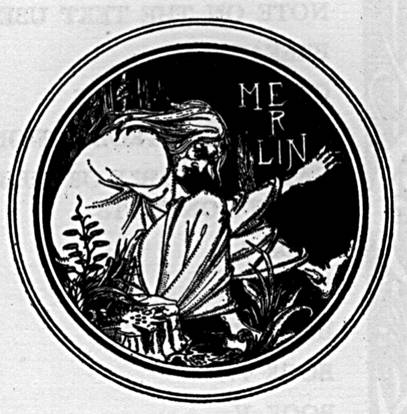 Deep into Wales, Merlin was sitting by fountain. In the years since Vortigern, he and his mother had lived a somewhat-normal life, but he knew that this day all that would change. Even if a friend hadn’t warned him that the king’s men were looking for him, he would have known. This king was an honorable man, though, and it was also kind of a big plus that he wasn’t searching for Merlin to use him as a sacrifice. He didn’t know when it was coming, but he knew the moment for him to return to power when he saw it, and it was here. He took the well-worn path down to the village, and met with the King’s men. He traveled with them to London.
Deep into Wales, Merlin was sitting by fountain. In the years since Vortigern, he and his mother had lived a somewhat-normal life, but he knew that this day all that would change. Even if a friend hadn’t warned him that the king’s men were looking for him, he would have known. This king was an honorable man, though, and it was also kind of a big plus that he wasn’t searching for Merlin to use him as a sacrifice. He didn’t know when it was coming, but he knew the moment for him to return to power when he saw it, and it was here. He took the well-worn path down to the village, and met with the King’s men. He traveled with them to London.
Standing before Aurelius, he could see the man was congenial and friendly, and, better yet, he was respectful. The first thing he asked Merlin was that he prophecize something. Merlin said a flat no, but then explained that his gift was only to be used in the most dire of circumstances, directed by wherever his powers came from, lest they dry up and never return. The king didn’t tried to intimidate him, but agreed, and told him all about the monument.
The Stonehenge dustup
 Merlin smiled. He had a plan. Long ago, as we all know, giants roamed the earth. Giants who lived in Ireland heard of some magic stones near Africa, so they got them and brought them back to Ireland. For the centuries that followed, normal people, and giants maybe, would wash the stones and then pour the water over sick or injured people, healing them.
Merlin smiled. He had a plan. Long ago, as we all know, giants roamed the earth. Giants who lived in Ireland heard of some magic stones near Africa, so they got them and brought them back to Ireland. For the centuries that followed, normal people, and giants maybe, would wash the stones and then pour the water over sick or injured people, healing them.
He finishes up by telling Aurelius that these stones were still in Ireland, and recommended that he build the monument to this church out of these clearly pagan stones, probably completely understanding the irony, as Merlin himself was an agent of god…maybe…built out of pagan and demonic parts.
Aurelius said that’s awesome! Here’s what they’re going to do. Merlin and Uther, Aurelius’s brother, are going to lead a small diplomatic force consisting of a massively intimidating army over to Ireland, and they’ll politely just take the stones from the land. If, by some small chance, the Irish decline to give up their magical land marks, the good, honorable Aurelius tells the Britons to just kill a bunch of them and take the stones. Apparently the Briton’s problem was not that they were being bullied by the Saxons, but that THEY were being bullied by the Saxons. They didn’t seem to have a problem with it if they could be the ones invading a country and taking what they wanted.
Everyone says that this seems pretty reasonable, so they do just that. Predictably, the Irish, led by the king Gillomanius, really don’t want to give up the stones, so Uther leads the army to kill a lot of them and they retreat. They approach the Giant’s Dance, the stones, and the men try to move them. They are utterly unable to budge them at all. Merlin then tells them to step back. This is why you bring a wizard.
He says an enchantment or a prayer, as he ducks around the stones, and then walks out. He tells the men to try again – the stones should be as pebbles, and they do. It went from moving a literal boulder to moving something akin to Styrofoam set pieces. They take the stones back to England.
Merlin is lauded in the king’s court and they stack them one upon the other outside Salisbury. When they are in place, Merlin says his enchantment again and they regain their weight and density, settling into the ground. Because it’s not at all foreshadowing, Aurelius builds a sepulcher…or a tomb… in the middle of the ring of stones. Those stones, called the Giant’s Dance in Ireland, will come to be known by a different name – Stonehenge.
If you're having insurrection problems I feel bad for you son, I got 99 wars but a revolt ain't one
Aurelius then surveyed his realm. He had restored the ancient order of things for his people, defeated the Saxons, and avenged his father. He was gonna be alllllright.
So what if he had displaced and subjected the angry Saxon army in his land... and just killed a bunch of people in Ireland and left a king alive for them to rally behind… that’s not…anything to worry about.
It was then that he learned that a son of Vortigern had lived. Passent, or Pacentius, had fled to Germany after his father was killed and was given asylum by…of all people…the Saxons. Oh, and they had landed in the north? Oh, and they had returned to their old M.O. and were burning up the countryside, toppling churches? He sighed. This is why the medieval Britons couldn’t have nice things.
He mobilizes an army and quickly routs Passent. Who instead of sulking back to Germany, goes to Ireland to visit with king Gillomanius who, yeah, would love to fight him some Britons. They join up together, and sail for Wales.
The Rise of Uther
Aurelius, on his trip back from the north, thought that he was getting sick, but also thought that it could be just allergies, so, but didn’t think it was anything to worry about. He set out from London again, this time with Uther and Merlin with him, to meet the Irish, Saxons, and Passent in Wales to settle all the family business. As they were passing Winchester, though, he found he was too sick to go on, and sent Uther and Merlin. Merlin knew what would happen – that this would be the last time he saw Aurelius, and he said a longer, sadder goodbye.
Word travelled around the islands that Aurelius was sick, and they were searching for a doctor. One Appas, a Saxon that had been living in Britain since the time of Vortigern, saw an opportunity. He goes to Passent, Vortigern’s son, and secures payment and promises of advancement, and then obtains a monk’s robe and vials of what is definitely good medicine and not poison. He gets in the habit of shaving his head and pretending to be a monk. He arrives a few weeks later at Winchester.
They wave him through. Sure, his head is freshly shaven and he kind of has a German accent and he came front the direction of the front but what’s not to trust about a menacing looking stranger who wants to give the sick king something from his vials?
So, he gives Aurelius the poison, and the man who was born with a world full of enemies and only managed to make more, finally died by their hand.
He manages to escape, and as he’s running off across the moors, he sees a shooting star darting across the skies. It looks like it’s in the shape of a dragon, and when that dragon reaches the end of its course, two other stars shoot out of its mouth.
That night, Merlin speaks his first prophecy since the ones he told Vortigern when he was seven. Now, in his early-twenties, he needs to spur this king on. He says through tears for Aurelius that Uther will be a great king. The dragon head in the shooting star was him. He’s a valiant knight who will be king and the father of kings. He needs to attack now, and he can utterly destroy the forces of Passent and the Irish. The king has seen the power of this young man who is to become his most trusted friend. He nods and orders his men to attack in the night. Merlin watches Uther gallop off at the head of his army. With this man, maybe he can make a place for himself and the Britons in this chaotic and violent world.
Ten Years Later
A decade later, Uther is waiting for a banquet to begin. Merlin, the king’s top advisor, comes in and informs him that his nobles were seated for a feast.
He sat at the head of the table, and looked at faces of men he had served with and whom had served him in the taking and protection of their lands. His eyes lighted on the face of Gorlois, the aged duke of Cornwall. The man had advised him well in his fight against the Saxons.
After Aurelius died, the Saxons under Octa and Eosa, Hengist’s sons, took their oath to not make war upon him very literally, and decided that since he had died, they had the right to take back what they saw as their home. The plotted in the inhospitable places Aurelius had exiled them to and recruited Saxons that had escaped after Passent died at the hand of Uther in Wales. When the realm was quiet and Uther thought he had finally achieved peace, they attacked. They nearly overpowered the Britons, but Gorlois advised the king that all the men should pray and humble themselves before God. The Britons were Christians and these men pagans, so the only reason the Britons should lose was that they were not praying to their Savior.
They prayed, and God listened. They took up their arms, and snuck down to the Saxon camp, finding all of them asleep. One particular text describes it as such, “The swordplay was right merry, for the slaughter was very great. The Britons thrust their glaives deep in the breasts of the foe. They lopped heads and feet and wrists from their bodies. The Britons ranged like lions amongst their enemies. The Britons were as lions a-hungered for their prey, killing ewes and lambs, and all the sheep of the flock, whether small or great.” See? Prayer really can move mountains. Or, at the very least, saying a nominal prayer before sneaking into a city at night can help you lop off the heads, feet, and wrists of sleeping men, women, and children. What’s all the more crazy is that these are the good guys of the story.
As a quick aside, if you have knowledge of the bible, in 1 Peter 5:8, the devil is actually called a roaring lion seeking someone to devour, and in numerous places Jesus and his followers are called lambs and sheep. I don’t know if it’s just some super intentional, biting, tongue-in-cheek commentary on the legend that a writer used that imagery, or if he really didn’t understand the deep and hilarious irony, but I thought that was interesting.
Skunkin' Around
Back to the feast, Uther’s gaze moves one more person down from Gorlois to his new wife. And it didn't keep going. It stayed there for so long that when Igraine, the woman, looked up, she met the eyes of the king. She looked away, looked back, and he was still looking, offering up a small, polite smile, before looking away. Merlin saw the exchange, and brought up a conversation with Uther on a contrived premise to get him to look away. He could see the king glancing back at the woman every so often. This was going to be a problem.
Over the next few days, all manner of gifts came to the chamber in which Golois and his wife were staying, but none of them were for the king’s old friend and comrade. The king persistently sought an audience with the young woman, but was continually rebuffed. He would give her attention over any others at banquets, despite her very clear communication that she wasn’t into him.
One night, she explained everything to her husband, who was both enraged and terrified. Ingrain said that they should leave immediately, before it progressed any further. Right now they were in the king’s household, and though there were customs to protect guests in such situations, the king was now the most all-powerful person in the realm, and lust could drive him to do terrible things. They fled that moment to the stables, and rode quickly for Cornwall.
That evening, as they sat down to a dinner, Uther noticed the Duke and his wife’s spots were empty. He asked about it. Them? They left, someone said. Yesterday, actually. They didn’t even pack up – they had their things sent after them. Weird.
The king was angry, and called his private council who said, yeah, they left, who cares? The king says he really wants to sleep with the Duke’s wife. Can’t they get them back? The council says that..wait, what? You want them to come back so you can…sleep with his wife? The king says yes, can’t we get them back? The people say, well, sure…I mean, you can summon them back and if they refuse, you could consider them in revolt but…really? I mean, in the past twenty years we’ve dealt with the murder of three kings, a succession crisis, a usurper king, not one, but three invading armies, and a revolt of the Saxons that had settled her. And you want to risk civil war because you want to sleep with a woman who’s, by any metric, not interested in you at all?
War of the Heart...or a different part
Yes, Uther says, absolutely. Let’s call them back, and if they don’t come back, let’s consider them in revolt and raise an army against them. His counselors sighed and did as he said.
The Duke was smart. He knew Uther was a persistent, ruthless man, and would not stop before he got what he wanted. He sent word ahead to prepare his armies to meet the king’s and prepare a castle on the coast for his wife. It was a castle surrounded by the sea on three sides, and deep into the Duke’s territory. It supremely defensible, and would be the last place Uther would be able to take, should he be successful in capturing the rest of the territory.
The king rode against his former friend, who had holed up in a defensible castle closer to the border. Gorlois had sent word to Ireland, to the king there, for aid against Uther, and only needed to wait. Uther could see his adversary was well-provisioned, and remained camped with his army.
He was pretty overdramatic, though, and one of his advisors, a Baron named Ulfin, saw that if he didn’t have Igraine’s love, the king would die. And because that’s definitely a thing, they call in Merlin. As we’ve previously covered in episode 3A, sorcerers learn how to transform people to look like other people during freshman year at wizard school, and Merlin proposes just that. I can’t really justify Merlin’s role in the whole Stonehenge thing, but his magic here does help to save some lives. Uther has shown his willingness to go to war against one of his subjects on a completely unjustifiable premise, and it’s unlikely he’s going to relent before he gets what he wants, as Gorlois won’t surrender and suffer that extreme shame. It’s either transform Uther and help him get what he wants, no matter how vile the man is, or thousands of people die in chaos and the king still gets his sleazy wishes.
Uther transformed into Gorlois, and Merlin and Ulfin to two of his knights, and they rode from Tintagel, where the lady Igraine was living during the war.
And there’s no problem at all. They ride up and through the gates, and no one questions a thing. It’s the middle ages, and this guy looks like the king, so this guy must be the king. It’s not like he had to sit at the guardstation in anxiety while they ran his ID, with hacker Merlin at a computer terminal, trying to get him into the system before they scanned it. Nope, these were the middle ages he said he was the king, he was flanked by the knights, and that was good enough for everyone involved. Let’s get back to being constantly drunk and dying of curable illnesses.
Good enough, too, for Igraine. Uther goes to the woman in the guise of her husband, and they spend the night together. It is from this union that King Arthur is born.
Merlin was anxious the next morning and he, still in the guise of a knight, gets Uther and they rush past the guard, riding off into the wilderness. Igraine thought that it was nice to spend a night with her husband, and was surprised to learn that not only was he besieged in a castle all night, but that he had been killed, and the brief war was over before it begun.
Everything was coming up Uther. His power had been demonstrated to his nobles, he had gotten what he wanted with Igraine, and she was now at liberty to marry him, him completely missing the point of why she and her husband fled in the first place.
He sends his advisor Ulfin to act as an intermediary. Igraine sees the inevitable, and surrenders the castle to Uther’s forces. She then agrees to marry him absolutely under her own volition and not at all because he just killed her husband and brought an army to her front door. I mean, she essentially has no choice in the matter, and much like with Yvain in episode 1B, the writers whitewash everything and make it look as if she truly loved him.
He doesn’t know this, but Octa and Eosa, Hengist’s sons, have escaped from prison in London. They bribed the jailer, who had a fairly dull life, and took him on the next ship to Saxony.
Six months pass, and it becomes obvious that Igraine is pregnant, and Uther tells her, much to her definitely not fabricated delight, that he’s the actual father. Merlin, the advisor to the king, is acting strangely. He knows what’s coming in the near future. Young Arthur, the boy not yet born, needs time to grow before he has the crown thrust upon him. Time he will not have if he remains with his parents. He calls a meeting with Uther and Igraine.
The Bad News
They are shocked that he wants to send the child, and heir, away, and at first don’t hear of it. Then Uther studies the man that has been with him his whole life. He had been an advisor to two kings before Uther, and the man was known for his knowledge of the future and magic. He helped Uther keep his crown over these years, and if the wizard is that deadly serious, it must be important. Uther put his hand on his wife’s shoulder, and she became quiet. He asked the wizard what they should do.
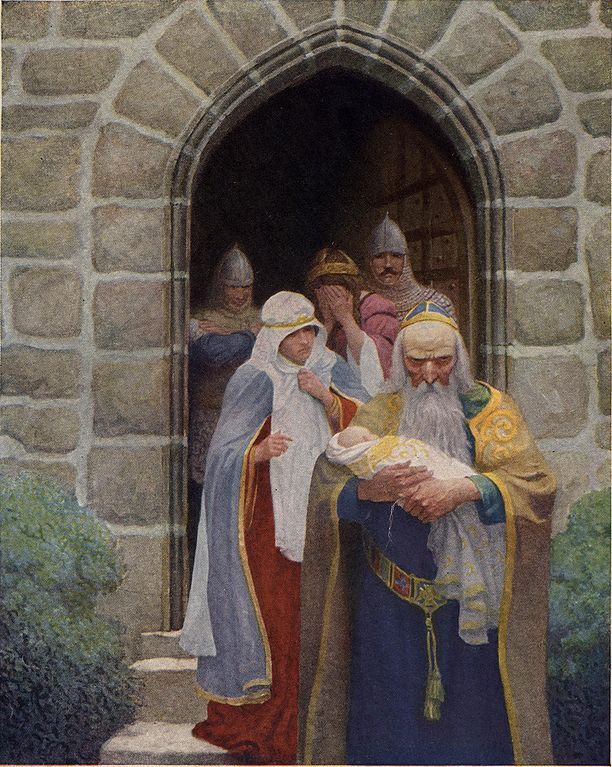 The wizard said that not too far away from here was a man of integrity, named Ector. He has recently had a son, named Kay, and so his wife would be able to feed the young child inside of Igraine. Uther must send the boy away when he was still a newborn, and he would live in the care of Ector, and be raised up as his son. Uther wanted to ask why this needed to be done, but he could see the sadness in Merlin’s face, and knew his time was short. His head bowed. He said they would do this, and Igraine wept.
The wizard said that not too far away from here was a man of integrity, named Ector. He has recently had a son, named Kay, and so his wife would be able to feed the young child inside of Igraine. Uther must send the boy away when he was still a newborn, and he would live in the care of Ector, and be raised up as his son. Uther wanted to ask why this needed to be done, but he could see the sadness in Merlin’s face, and knew his time was short. His head bowed. He said they would do this, and Igraine wept.
Months later, there was the scream of a child from inside the castle, and as soon as he was cleaned off, he was wrapped in a gold cloth and delivered to Ector, who was waiting with his retinue just outside the castle walls. Then there was more crying from the castle, as Uther and Igraine realized the full weight of the impossibly hard decision they just had to make.
In the following months, it became apparent why Merlin had sent the boy away. Uther became ill, and his problems were compounded when Octa and Eosa, the sons of Hengist, having heard of his illness, used the opportunity to invade. They fought bitterly and the Britons lost many men, but eventually Octa and Eosa were killed, ending the line of the Saxon king Hengist that had started all of these problems.
There was still the matter of all the Saxons on Great Britain, though. Like I said, they were there to stay, and some sympathized with the men the Britons just killed, the men they saw as their rightful kings. A small conspiracy formed to poison the king. He had lost a child a couple of years ago, so there was no heir, and the realm could descend into war should they strike before king could cement a succession plan.
Uther had been ill for some time, and it was well advanced. The conspirators found that they couldn’t get close to him, as one Saxon had been able to with Aurelius – the king was smart, and only let physicians he could trust administer him medicines. These Saxons couldn’t get in the front door, let alone in the king’s bedchamber. It was then they learned of a spring.
The king had taken to drinking water from a natural spring, and it was open to everyone. They decided to hedge their bets, and dumped way too much poison in the thing. It did its job. More than that, actually. No one suspected the poisoning of the king, because over a hundred people died from the spring before the source of the sickness was discovered and piled over with dirt.
Uther died the same way his brother did, though not without taking every precaution. After he died he went to the same place as his brother, and was buried at Stonehenge. Though not a good man by any modern interpretation, he seemed to be an appropriate man for the job of king in these times. He was shrewd, brave, and ruthless, and he secured his kingdom in a time of great strife. But he was really, really sleazy and pretty much a rapist, so I’m not going to commend him much beyond saying that at least he didn’t drop the kingdom in the toilet like some of his predecessors.
The Saxons in Great Britain once again sent word home to Saxony, and they invaded. Putting the issue of succession on hold, the earls and barons fought off the Saxons and kept them from taking the island. Then, finally, the war of succession ensued.
Arthur...finally
It got bad, and though the stories don’t really say how bad, it led to a time, at least a decade after the death of Uther, where Merlin was able to call all the competing factions to London for a peace talk on Christmas Day. He had been watching a vacant throne for years while the different factions fought it out for the role of high king. Things were about to reach a breaking point, though, and a solution had to be reached. He knew who the rightful king was, but everyone else had to see. Somewhere in the crowd was the boy, supposedly the son of King Ector, who was about to shape the world he lived in. In him was royal blood – he just didn’t know it.
At this point, everyone knew of Merlin’s power. Those that hadn’t seen his enchantment of Stonehenge had heard of his prophecies or of any of the various other rumors about him. The war of succession at a stalemate, they were all hoping to move on, and they trusted this man, even though it was rumored he was half demon, to show them God’s will.
They went to mass, and outside there was a sword stuck in a stone. All around that stone read, in shining gold, “Whoso pulleth out this sword of this stone and anvil, is rightwise king born of all England.” After mass, everyone tried their hand at pulling the sword out, but none could even get it to budge, let alone pull it out. They figure the real king has to be someone there, but try as they may, they can’t get it to work. Instead of just ignoring cheap trick that Merlin had conjured up and resuming their war, they decide that this magician knows what he’s doing, and they all wait around London for the king to make himself known. They leave some knights to guard the sword, and everyone participates in a grand tournament on New Year’s Day.
The Sword in the Stone
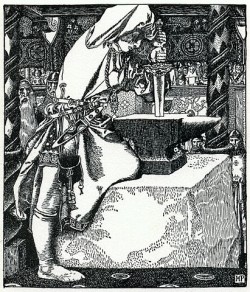 During the tournament, a young man sneaks into the courtyard. He’s here with his household, and his brother, Kay, is fighting in the tournament here soon. Unfortunately, Kay left his sword at home, and since this boy isn’t fighting, he offered to go get Kay a new sword. He had seen one in the courtyard, just sitting out, and it looked as if the guards had left to see the tournament. He would just borrow this sword for a moment, for his brother, and have it back before anyone noticed. Whoever owned it must not care too much about it, anyway, since he just left it laying out here in the open. He was in such a hurry that he didn’t stop to read the words etched underneath the stone. With very little effort, Arthur slid the sword out of the stone and ran it to his brother, Kay, at the tournament.
During the tournament, a young man sneaks into the courtyard. He’s here with his household, and his brother, Kay, is fighting in the tournament here soon. Unfortunately, Kay left his sword at home, and since this boy isn’t fighting, he offered to go get Kay a new sword. He had seen one in the courtyard, just sitting out, and it looked as if the guards had left to see the tournament. He would just borrow this sword for a moment, for his brother, and have it back before anyone noticed. Whoever owned it must not care too much about it, anyway, since he just left it laying out here in the open. He was in such a hurry that he didn’t stop to read the words etched underneath the stone. With very little effort, Arthur slid the sword out of the stone and ran it to his brother, Kay, at the tournament.
That day, at the tournament, the son of Uther and the grandson of Constantine would make himself known. His name would become a legend, and he would be a conqueror of faraway lands. He looked at the sea of people kneeling to him, at his foster father and brother on the ground before him, and he could hardly take it all in. Much like the snow, though, the tranquility of his childhood will melt away as spring comes, as he’s forced to face the mean task of ruling a divided people. The next time we meet up with him he’ll be putting down several rebellions because all those people with armies who said they were cool with the magical king selection process were very much not cool with the magical king selection process. He’ll manage, though, and the fires of war and revolt will temper a legendary king the likes of which the world had never seen before.
That will not be next week, though, but some episodes down the road.
Next week I’ll be out taking some time with the family, but I’ve recorded a smaller supplemental. It’s a fan request where I’ll tell the story of Myrddin the Wyld, one of the chief inspirations for Merlin. In that story you’ll learn that there’s no problem that getting naking, going crazy, and running off into the forest won’t solve.
In two weeks, I’ll jump back in earnest with another request of the original story of the little mermaid. I know what you’re thinking but it is so ridiculously, darkly different that you really need to give it a shot.
I want to thank Nimbus Pixie, Jan-Jaap Schraverus, Geesby 934, and Sk is meh, for the reviews on iTunes. Nimbus Pixie, let me know over Twitter or e-mail or something what Asian folklore you had in mind, and I’d love to incorporate it.
Likewise, if anyone has any corrections, thoughts, or requests, let me know on the site, on twitter, on facebook, or anywhere. I’d love to talk to you. Oh, and if you’ve enjoyed the show, please consider leaving a review on iTunes. Links to everything are in the show notes.
Creature of the Week
The creature this week is the Dullahan, and if you’re eating right now, you should probably pause this, finish your meal, and then keep going, because it’s so disgusting that it’s completely over-the-top.
The Dullahan is a headless horseman from Irish folklore. He carries his head around with him because he needs to see and stuff, and it constantly has a huge, joker-size grin that stretches from one side of the head to the other. He doesn’t take great care of his head, though, and it’s said to have the color and consistency of moldy cheese.
But wait, there’s more. He carries a whip made from a human spine with him, and he rides in a wagon made out of all sorts of grisly things. The lanterns he has with him are human skulls with candles in them, the wheels are made from human thigh bones, and the covering for the wagon is made from tried and tanned human skin. We get it, Dullahan, you’re a bad guy. At some point he’s just overcompensating.
If he stops for you, that’s it – he gets your soul, and as soon as he says your name, you die. There’s no way to stop him, though. Gates, locks, and doors all open before him, luckily, though, he only gets to say one name per trip. Unlike seemingly literally everything else on this earth, he’s averse to gold, so if you have even the smallest amount of gold on you, you can drive him away.
Lastly, he doesn’t like being watched when he’s on duty, and even though he can only take one soul per trip, he might whip at you with his human spine, or he can mark you for death in the most obvious way possible, by taking a huge basin of blood he for some reason carries around with him, and dumping it on your head. Really, he’s evil, we get it.
Coincidentally, he’s said to be active around the end of August or beginning of September, around the time this episode drops, so the storytellers advise to stay home with the curtains drawn, not that it would do much good. If you have to be traversing the Irish countryside, be sure to have some gold on you, or you might get a very literal bloodbath.
That’s the show this week! The theme song is by the band Broke for Free and the creature of the week music is by the noble Steve Combs. Links to other music I used are in the show notes. Thanks so much for listening, and I’ll see you next time.

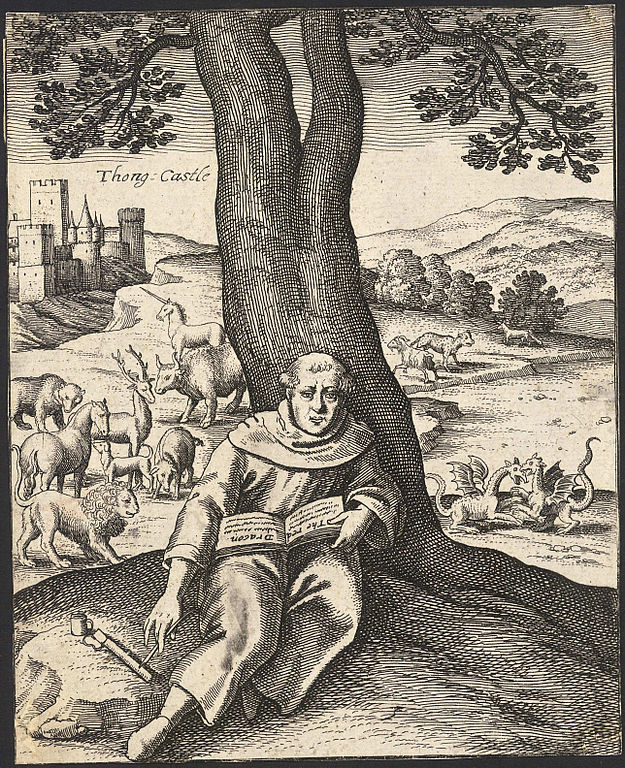
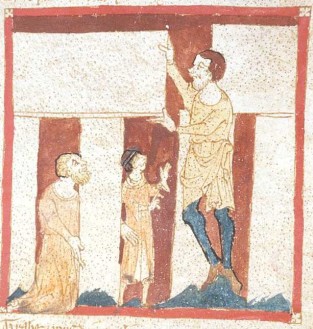
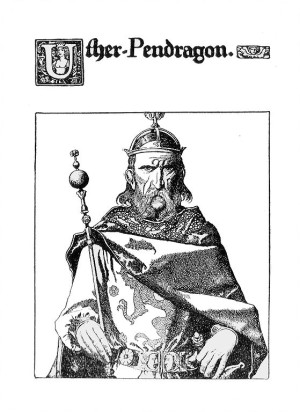
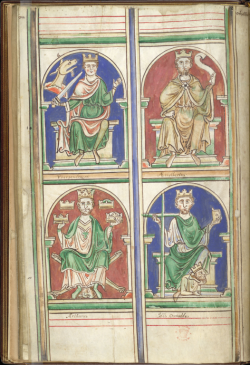
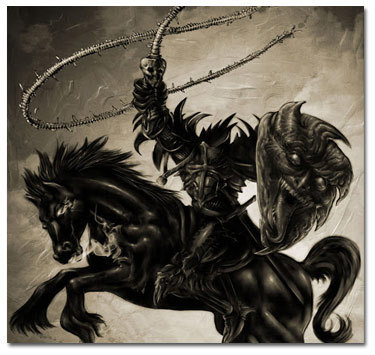
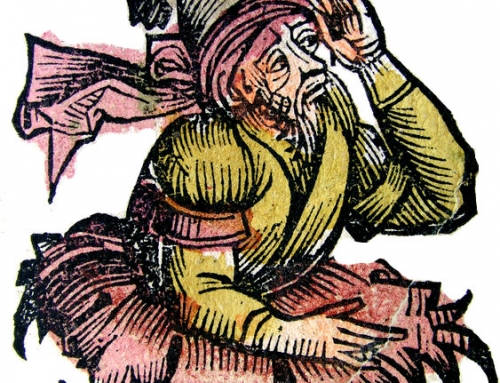

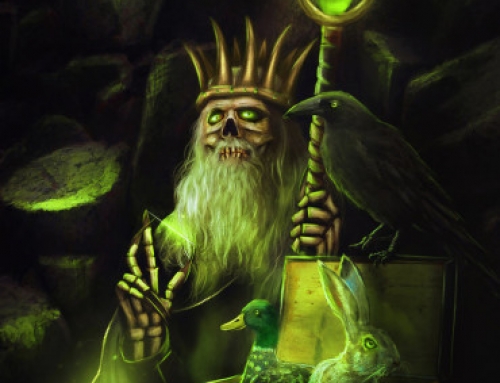
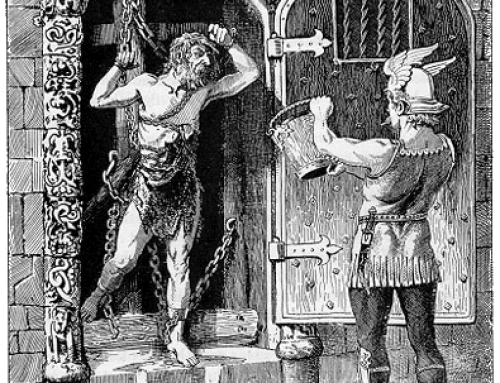

Could you put transcripts for all the episodes? I like to use them in class and also I sometimes retell the story to my siblings.
for the episodal stories like this one, could you add links to the previous parts’ transcripts? we use these in my mythology class a lot and sometimes I prefer to read them and it’d be easier if the stories were together like that